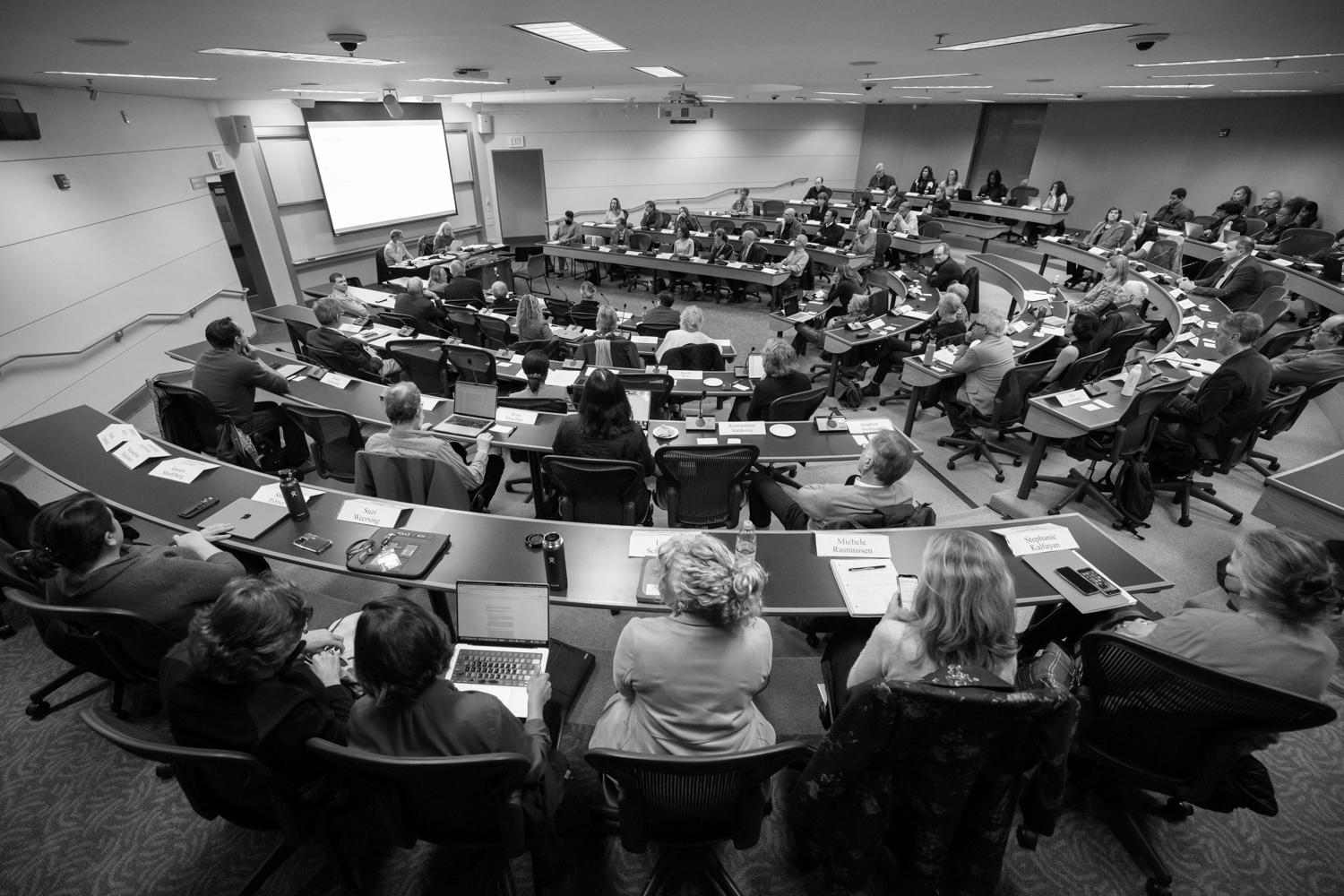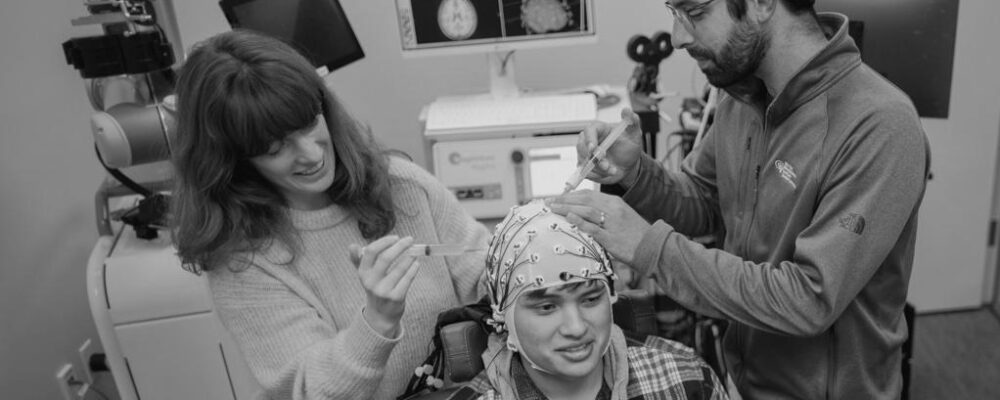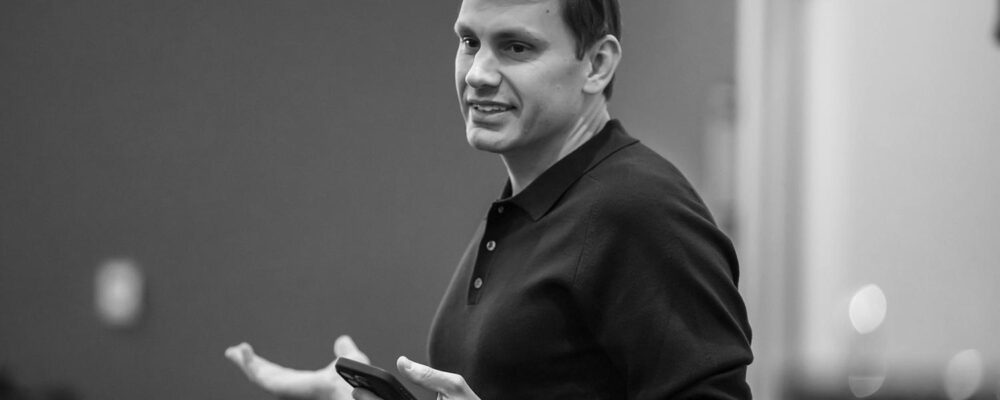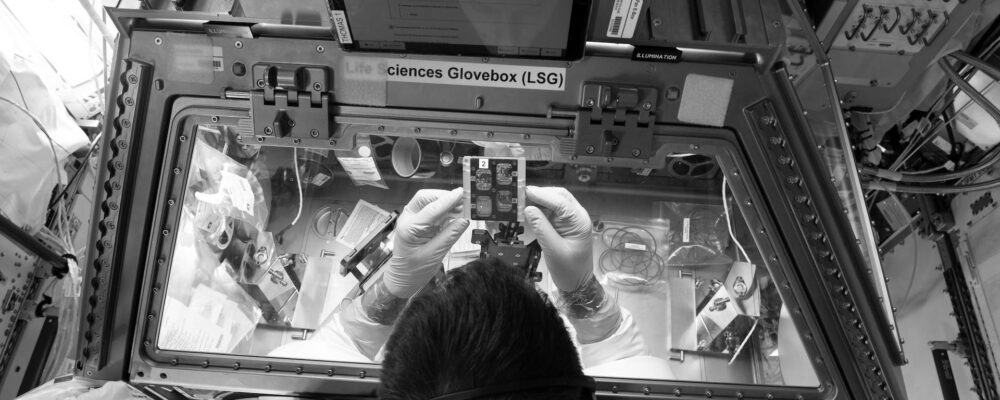The Faculty Senate voted against rescinding its 2020 censure of Scott Atlas, a Hoover Institution fellow who advised President Donald Trump on COVID-19 matters, following a lengthy discussion on Thursday.
Deans from the Graduate School of Business, School of Engineering, School of Humanities and Sciences, and School of Law also shared their guiding priorities with the senate during the last meeting of the fall quarter.
In response to a senator’s question, Provost Jenny Martinez provided an update on disciplinary hearings for students involved with the occupation of the president’s office and an encampment case. Panels from the Office of Community Standards found the students responsible for violations of university policies.
Sanctions included two-quarter suspensions followed by probation, delayed degree conferrals, and community service hours. Time under interim suspension while the cases proceeded will count toward the total disciplinary suspension time.
Multi-quarter suspensions will remain on students’ permanent disciplinary records after graduation, and the students involved with the building occupation may still face criminal penalties as determined by the county district attorney. Students have the right to appeal under the university’s student conduct charter.
Martinez noted that the university continues to evaluate the fairness, effectiveness, and timeliness of the student disciplinary process.
“We’re not able to provide additional details due to student privacy considerations, but in answering your question, I thought it was important for the safety and integrity of the campus community, in terms of conduct that harms and disrupts campus operations and confidence that rules are being enforced, that we share this high-level summary of how the disciplinary process is working,” Martinez said.
Vote on censure
Earlier this year, the senate debated rescinding the 2020 censure of Atlas, with several senators arguing he was denied due process and that the censure violated principles of academic freedom. The matter was referred to the Planning and Policy Board (PPB), which presented its findings to the senate in October. The PPB emphasized that censures should be rare and reflect the university’s principles of fair process, academic freedom, freedom of expression, and institutional statements. The PPB’s review also found Atlas was not afforded due process and noted a lack of clarity around the senate’s governing documents regarding censure authority.
As a result, the senate established an ad hoc committee to review key issues of academic freedom and the senate’s role in censure-related matters. The committee will report back to the senate this academic year.
Thursday’s debate focused on the extraordinary context surrounding the censure, academic freedom and freedom of speech, and Atlas’ prominent role as a White House adviser at the time.
Opponents of rescission emphasized the broader implications of validating Atlas’ views. James Ferrell, professor of chemical and systems biology and of biochemistry, said doing so could be viewed as validation of Atlas’ views and conduct in the early days of the pandemic. “He denied basic established facts about COVID, and he did it from a position of high official prominence,” Ferrell said, adding that Atlas’ threat of a defamation lawsuit against faculty constituted an attack on their free speech.
Steven Goodman, a professor of epidemiology and population health in the School of Medicine, contended that the PPB’s report did not adequately capture the significance of the lawsuit threat. He called the censure a “last-ditch effort” to protect faculty’s academic speech.
In contrast, Jonathan Berk, the A.P. Giannini Professor of Finance in the Stanford Graduate School of Business, called the censure a “mistake” that needed correction to safeguard freedom of speech. “Good, happy speech needs no protection,” Berk said. “What needs protection is unpleasant speech.”
Julie Parsonnet, the George DeForest Barnett Professor in Medicine, reminded the senate that at the time, there was a sharp exponential increase in COVID cases. “We were very concerned about being overwhelmed and that the hospital would collapse,” Parsonnet said.
During the pandemic, saving lives was a higher priority than following due process, Parsonnet continued. She commended the senators for “their willingness to speak up to save lives and also to preserve faculty speech.”
Josiah Ober, the Constantine Mitsotakis Chair in the School of Humanities and Sciences, countered that it is a basic democratic right to be notified of an accusation and to have the opportunity to defend oneself. “It is absolutely the worst thing that we can do is to create a precedent like this just because it was a time of emergency,” Ober said. “The worst precedents come in times of emergency.”
Sara Singer, a professor of health policy and medicine, was one of 100 School of Medicine faculty who signed a letter condemning Atlas’ statements at the time. “I signed the letter to support trusted colleagues and best available evidence in what was clearly a moment of crisis for our health center and community,” Singer said. “What made Scott Atlas’ statement different was that he was a public figure and he was using the power of the White House to threaten Stanford faculty into silence.”
The 21-13 vote was held via secret ballot.
School updates
Deans from the Graduate School of Business (GSB), School of Engineering (SoE), School of Humanities and Sciences (H&S), and the Law School shared how their schools are addressing future challenges through creative interdisciplinary research and educational initiatives.
School of Humanities & Sciences:
Mary Beth Mudgett, senior associate dean for the natural sciences in H&S and the Susan B. Ford Professor, presented on behalf of H&S Dean Debra Satz and highlighted the school’s interdisciplinary programs.
H&S, which comprises a quarter of the university’s professoriate, faces growing demands by faculty and students to incorporate technology and data-intensive research into their work. Mudgett emphasized the need for resources to upgrade facilities and equipment to support these advancements.
She also highlighted several H&S initiatives such as Stanford Impact Labs, which provides funding for large data sets and social science analysis, and the Stanford Science Fellows, which aims to develop a pipeline of diverse young STEM scholars. Additionally, the new Institute for Advancing Just Societies and Department of African and African American Studies are expanding scholarship on race and ethnicity.
Law School:
Dean George Triantis discussed the law school’s efforts to adapt to students’ evolving needs as more alumni broaden their careers beyond traditional legal practice. He emphasized the importance of equipping students with the skills to excel in these diverse career paths efficiently.
This includes adapting to AI’s impact on the legal profession, integrating AI into legal work, and obtaining computational resources needed to do so, Triantis explained.
Anticipating significant retirements in coming years, the law school is also focused on rejuvenating its faculty.
“There’s never been a time, at least not in my life, where legal institutions have played as an important role as they do today, and therefore, our missions of education and research have never been as significant as they are today, so it’s a thrilling time to be at the law school,” Triantis said.
In response to questions about law students’ career trajectories, Triantis noted that graduates go into both the public interest and private sectors. “We want students to graduate with a strong sense of public interest and public duty and professional duty, not devoted to one or the other,” he said.
Graduate School of Business:
Peter DeMarzo, interim dean of the GSB, discussed several initiatives launched by the GSB, including the Initiative for Financial Decision-Making, a joint initiative with the Department of Economics in H&S and the Stanford Institute for Economic Policy Research, as well as the Business, Government and Society Initiative, which supports interdisciplinary teaching and research across intersections of business and society.
The Pathfinder pilot program, in which juniors, seniors and coterminal master’s students take GSB courses, was launched about a year and a half ago with seven courses for undergraduates and has since expanded to 14 courses, DeMarzo said. Also, the school’s Business Essentials program, a two-course sequence for undergraduates interested in business, will be launched in the coming year along with an online certificate program.
The GSB continues to pursue innovative ways to collaborate and is making lots of investments in AI and constructive discourse, DeMarzo said. It also looks forward to celebrating its centennial in October next year.
School of Engineering:
SoE, which is also celebrating its centennial next year, is uniquely positioned as an engineering school because it is embedded in a world-class liberal arts university and shares a campus with four professional schools, said Jennifer Widom, the Frederick Emmons Terman Dean of the school.
The priority of the SoE at this time is strengthening the excellence and diversity of its faculty, and making investments in nanofabrication and maker spaces to accommodate strong student desire for experiential learning, Widom said. There’s also a significant appetite for classes on AI and on ethics and technology in curriculum and research.
The SoE opened the Stanford Robotics Center earlier this month, and it will see the opening of the Computer and Data Science Building in the coming year.
The school also held a couple of school-wide competitions recently, Widom said. In one, people competed to decide how to use newly available space. That resulted in the new Student Projects and Resource Clubhouse (SPARC), a home for student organizations university-wide.
In memory
The Faculty Senate also heard a memorial resolution for Charles Steele, professor emeritus of mechanical engineering and of aeronautics and astronautics, who died Dec. 9, 2021, at age 88. Steele’s expertise ranged across disciplines, from engineering to biology, and he led an influential career as a researcher, editor, and mentor.
For more information
Peter DeMarzo is the Philip H. Knight Professor and the John G. McDonald Professor of Finance at Stanford GSB and senior fellow at the Stanford Institute for Economic Policy Research. George Triantis is the Richard E. Lang Professor and the Charles J. Meyers Professor of Law and Business. Jennifer Widom is the Fletcher Jones Professor of Computer Science and professor of electrical engineering.
“Stanford University, officially Leland Stanford Junior University, is a private research university in Stanford, California. The campus occupies 8,180 acres, among the largest in the United States, and enrols over 17,000 students.”
Please visit the firm link to site






